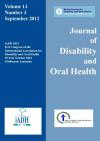Journal of Disability and Oral Health

- Cover Date:
- September 2012
- Print ISSN:
- 1470-855
- Vol:
- 13
- Issue:
- 3
Oral Abstracts
Alphabetically listed by speaker’s surname)
Sedation in children and special needs patients Alcaino E Behaviour management is an integral part of the practice of paediatric dentistry. Although most children are able to receive dental care in a normal setting with behaviour management or non-pharmacological techniques, a number of children have significant medical conditions, intellectual and physical disabilities or simply cannot cope with dental care in a normal setting. This presentation will review current philosophies in paediatric dental sedation across the world. Dental services vary enormously from one country to another, as do the drugs and techniques available. Controversy as to what techniques and who delivers sedation in the field of paediatric dentistry is also an area of debate. A summary on the use of sedation techniques will be addressed, including the use of nitrous oxide, oral sedation, intra-venous sedation and general anaesthesia. Careful patient selection, adequate informed consent, and specific clinical criteria appear to be vital for success. Knowledge of ‘red flags for sedation’ including child obesity, paediatric conditions associated with a compromised airway, doses of local anaesthesia in children and other anatomical factors must be considered. Discharge criteria in children is an area that has received much attention lately given that complications may arise after a child leaves the dental surgery or hospital.
Oral Abstracts
Autism Spectrum and Down syndrome Bellis W This presentation will cover the aetiology of Autistic Spectrum Disorder – the genetics and other suggested theories will be presented. The impact on the family of having a child with ASD will be discussed as will the reasons why ASD is such a fad magnet when it comes to therapies. The evidence regarding this will be explored. In addition, the specific problems relating to ASD and oral health will be outlined.
Improving oral hygiene: what does the literature say? Darby I This presentation will look at ways of improving oral hygiene in patients that have difficulty cleaning or rely on a carer to clean. These patients have high levels of plaque and inflammation, which may lead to severe disease. It will look at the literature presenting the methods available. An evidence-based assessment of what works and what is practical will be presented.
Inherited coagulopathies and modern methods of haemostasis Dougall, A This session will discuss the meaning and value of good and poor oral health for people with common congenital bleeding disorders, such as haemophilia and von Willebrands disease. The session will use case based examples to highlight current thinking on risk assessment for common dental interventions using contemporary methods of haemostasis, and will suggest preventive approaches to oral health and integrated models of service delivery.
Undergraduate education in Special Care Dentistry Dougall, A This session will present the results of the iADH Education Taskforce in developing curriculum guidance for education in Special Care Dentistry at the undergraduate level. Specific learning outcomes resulting from an International consensus process will be detailed. They reflect agreement of a Delphi panel of 63 experts from 31 countries as to the minimum core skills required of a graduating dentist in order to serve the population requiring special care in their own community. The learning outcomes bear witness to a paradigm shift from the medical model to the biopsychosocial model as illustrated by the International Classification of Functioning (ICF), a model which will be described during the meeting. This session will also give examples of ICF-inspired teaching methodologies and assessments from around the world. A discussion will be held as to barriers and facilitators to the implementation of this iADH Curriculum.
- Article Price
- £15.00
- Institution Article Price
- £
- Page Start
- 87
- Page End
- 97
- Authors
Articles from this issue
- Title
- Pg. Start
- Pg. End
